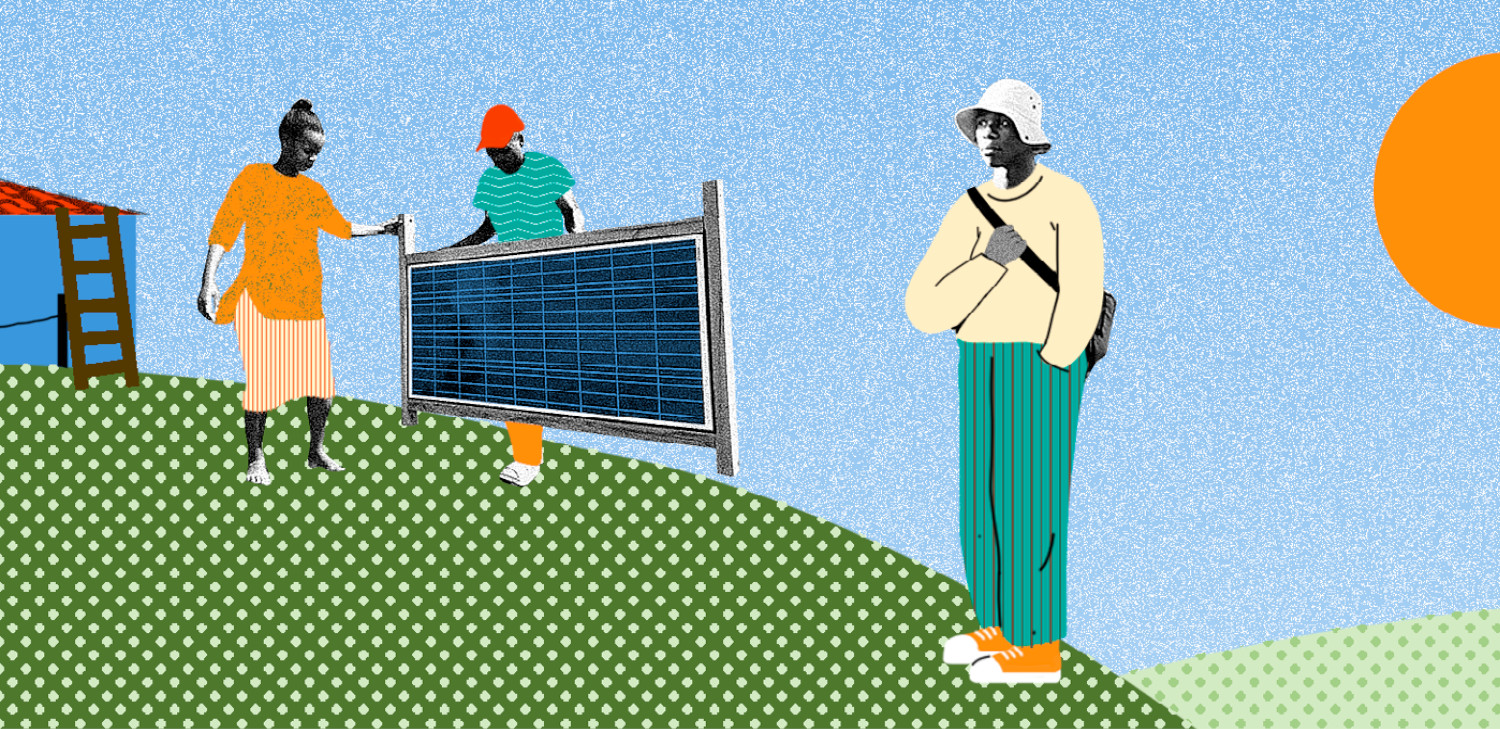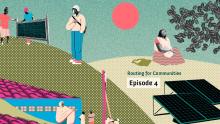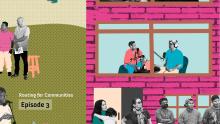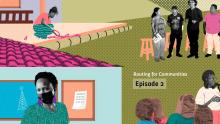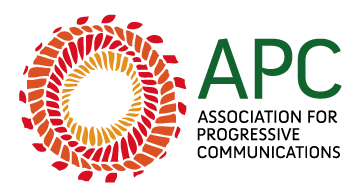#4 Amadiba Community Network and the people resisting in South Africa's Wild Coast
In this episode you will get to know the Amadiba Community Network, a project that has been strengthening the community's fight to defend their land, the coast of their country and their people, through access to the internet. Guiding us on this journey is Lungelo Mtwa, from Pondoland, a region on the coast of South Africa bathed by the Indian Ocean. Also in this episode, we interviewed Mike Jensen, an internet pioneer working at the Association for Progressive Communications (APC). We’ll talk about ideas for thinking about connectivity and community networks.
“Routing for Communities” is a twelve-episode podcast. Here you are going to listen to the life stories of those who build innovative and bold community-led projects to connect the one-third of humankind that is still living offline.
Stories and voices that are intertwined, connected by one thread: building internet and communication community networks.
Hello! My name is Renata Porto, I’m from Brazil and I will follow you along this twelve-episode season.
In this podcast, you are going to listen to life stories of those who build innovative and bold community-led projects to connect the third of humankind that is still living offline.
The story I'm going to tell you in this fourth episode of our series comes from thousands of kilometres away from where I am…
Today you will get to know the Amadiba Community Network. A project that has been strengthening the community's fight to defend their land, the coast of their country and their people, through access to the internet.
“Having Wi-Fi in the community will be very helpful. As I'm saying we have many stories to share with the world, we have struggles and victories.”
Guiding us on this journey is Lungelo Mtwa, from Pondoland. This is a region on the coast of South Africa, bathed by the Indian Ocean.
Also in this episode, I'm going to introduce you to Mike Jensen, an internet pioneer working at the Association for Progressive Communication (APC). We’ll talk about ideas for thinking about connectivity and community networks.
“When we support small community members to work together to achieve connectivity for their community, this also gives them a sense of empowerment.”
So come with me on another episode of our podcast!
“Hi, can you hear me?
Hello, hello. (noises). Should I put it like this? Yeah. Should I. Okay. Hello hello.”
As soon as Lungelo enters the cell phone video call for our interview, his camera is horizontal, but the image is rotated. He then adjusts the device, turning it from side to side until it is in vertical position, with his face well centred. He is a young man wearing a woollen water green hat and a brown patterned coat. After adjusting the camera, he is happy with the result and smiles. His concern with the quality of the video represents a little of who Lungelo is: a communicator, environmental and digital activist, as well as a tour guide among many other activities.
“Hello. My name is Lungelo Mtwa. I am from Pondoland. I am 27 years old this year and I am part of Amadiba Community Network, which is a new community network which was founded just at the beginning of last year. I'm also part of the people who are in the front of tourism who are guiding people along our Coast, our area, also facilitating about our culture, our traditions. We also lead a team where we tell the stories about our land.
Lungelo was born into a farming family led by his mother, and he has four siblings. He has roots in his territory and traditions.
The Lungelo community is called Amadiba. It is home to about 300 families and is located in Xolobeni village, a territory that has 100% of its population black and 97% having isiXhosa as first language.
The community is located on the east coast of South Africa in a region known as Pondoland, home to the Pondo people for the past 1,500 years. Its home province is Eastern Cape, where Nelson Mandela and Winnie Madikizela-Mandela, central figures in the fight against apartheid, were born. Today, the region is one of the last vestiges of the country's untouched coastline, known as the Wild Coast.
“My village, Amadiba, is like the old Pondoland. We are a rural village which some people from outside the area, they regard us as primitive people. They say we are living in the past, because our village is still very natural, very raw. And our houses scattered maybe 500 meters in between from one house to the other. So whichever there is a big space between the houses, between the homestead, we use it for farming, also using for grazing. So we are in a rural area which is close to the ocean, very unsolved ocean, a very wild ocean. Our area is, our Coast actually, is known as the Wild Coast, because there's not much building along the coast. It is beautiful, it is waterfalls plunging into the ocean. We have leaves, we have forests, we have hills, we have across my village you have a reserve, a reserve which you see many animals in the reserve. And our people are still practicing the old ways, as people say, we are still clinging on to our culture, our religion. We still know that the person is a person because of the next person, of the other person. So what has been called Ubuntu. Ubuntu means ‘humanity’. Ubuntu means ‘I am because we are’.”
But Amadiba lives not only on natural beauty and the preservation of its traditions, but it is also known as a community that is threatened by a titanium mining project.
This project has met with strong rejection from the local community as well as strong resistance for decades. Among the actions is the creation, in 2007, of the social movement “Amadiba Crisis Committee”.
“Our reasons why we are fighting against this mining and stuff is because we know that we are Indigenous people of this land, and then we are belonging to the land, we are dependent on the land. We know that we are going to be moved once the mining comes in, we are going to be relocated.”
The song you are listening to – which also opened this episode – is a video recording made by Lungelo and published on his YouTube channel. In the title we see the name of the song, “AmaMpondo akayifuni iMining”. The word AmaMpondo means “The Mpondo People” and the subtitles in the video translate the lyrics that say: “No! The Mpondo People don’t want the mining, but we have already pushed it away. How did you pushed it?”
In the image, there is a group of about 20 women and 10 men organised as a choir inside a house with plaster walls and a thatched roof. Most wear a black T-shirt with the “Amadiba Crisis Committee” logo. The women are wearing yellow or blue skirts with stripes and a front pocket, like a kitchen apron, and long beaded necklaces crossed over their chests. The men hold branches in their right hands, which they sway as they sing and dance to the music. All are dark-skinned black people, just like Lungelo. It is difficult to see this image and hear this song without being moved by the struggle of the Mpondo people.
The beginning of the construction of the Amadiba Community Network has to do with this context of traditions and resistance.
“The reason why we started a community network is because we have a problem with the signal in our area, so we saw that having Wi-Fi in the community will be very helpful. As I'm saying we have many stories to share with the world, we have struggles and victories. We need to say this to the people who are also threatened with the similar stuff that we are also being treated. So we are always saying we want to bridge the digital divide, so having the network means that our people will have access and will be connected to the world.”
Lungelo tells our team that, since 2019, people from his village have been seeking to learn about and relate to other experiences of community networks and organisations in this area.
Even before embarking on this process, Lungelo says that meetings were held in the community to define whether there was indeed a need for internet access and the creation of a community network. The answer was that it was as necessary as food production and education.
This wish may start to come true in 2021, when Lungelo and two other women from Amadiba participated in the first School of Community Networks in South Africa.
The school brought together representatives from seven communities in South Africa's digitally marginalised localities. Over the course of 12 months, they participated in a training and mentorship program to either seed or grow community networks in their respective communities. It was led by Zenzeleni Networks NPC.
Zenzeleni is an inspiring initiative for South Africa and the world, which have much experience to share. This award-winning community network currently supports broadband connectivity in the rural Eastern Cape.
Zenzeleni Networks connects more than 24,000 people and 21 institutions in their region, offering prices substantially lower than traditional operators. Revenue from local internet sales remain within the communities in which they operate.
There is a fundamental parenthesis here. Did you know that internet prices in South Africa are among the most expensive in the world? So it is. Because of that, the poorest population there does not have access to this service.
That's why community network projects become so important. They propose other connectivity models in which people pay much less for the internet and there is local income generation. With this, they help not only in digital inclusion, but also in the sustainability of communities.
What leads to the construction of a network like this happens in a very specific way in each territory, and depends not only on the wishes of the community, but also on technological and economic possibilities.
In the case of Amadiba, the flat geography with many tall trees, aligned with a precarious infrastructure, imposed some technological limits. Also, the majority of the local population has low financial income, so the best way is to prioritise collective access points, known as hotspots.
In the first months of 2023, Amadiba CN had its first antenna with internet access installed in the library of the Baleni High School, which has contributed a lot to local education. One next antenna is planned to be installed at the community's clinic.
According to Lungelo, internet plans are contracted from a company, as well as electricity. In the first three months, the internet was free for the population, as there were resources from the School of Community Network to cover data costs. In the following two months, they relied on resources from a project developed with the Honnold Foundation, which is also a partner of Amadiba CN. Afterwards, accesses began to be sold to local residents through low-cost prepaid vouchers.
Even though the Amadiba project is in its early stages, the challenges and dreams are big. The list of next steps include having a headquarters space for the community network with its own solar energy. There people will be able to connect to the internet and also work, study, promote meetings and other activities.
“Our slogan is ‘we will figure it out’, and then we were able to figure almost everything out. We've been a strong team since the beginning of the school.”
From South Africa, come with me towards the north, to Lisbon, capital of Portugal. That's where our next interviewee was when we connected via video call.
“Hi, Mike.
Hi, Vivian.
Hello, how are you?
I'm alright, how are you?
I'm fine. Thank you for accepting this invitation for the interview.
Sure! No problem.”
Living between Portugal and here in Brazil, Mike Jensen was born in Johannesburg, South Africa. He left there in his teens and lived and studied in different countries such as the United Kingdom, Canada and Ireland.
Far beyond borders and countries, what defines Mike is that he is an “internet pioneer”, working especially in the development of connectivity in the non-profit sector.
“My name is Mike Jensen, I'm originally a South African. I'm originally an ecologist. For a while, I became a journalist. And in the process of that I discovered electronic communications and thought that this is a very powerful tool. So I ended up actually in Canada starting an internet service provider for Environmental organizations, back in about 1986, before the internet really took off. Then I started to work to help other networks get started in other parts of the world, mainly in Africa. And from that network emerged the Association for Progressive Communications, where I continue to work today, mainly in the sustainability innovation and research area of work. And I work helping small communities adopt these new technologies, new business models, new working strategies and services to help ensure their sustainability in replicability, as part of the APC's LocNet program.”
In our conversation with Mike, his trajectory and experience in working with connectivity and community networks stand out. This season of the podcast is precisely about these themes and this episode tells the story of a network that is just being formed in search of a greater connection with the world. That is why we thought it would be essential to start by better understanding these two concepts.
“Connectivity it's a kind of broadened concept. Initially people talked about connectivity just in terms of being connected to the internet. In the course of our work, over the last few years, we've realized that connectivity really is about the connectedness of an individual to communications and information services. This might not just be internet connectivity. It might be connectivity through a community radio station for example or some other form of communications technology.”
Mike explains that community networks initiatives are very diverse. In many community experiences, people from the community can get together to build antennas for example. They can also buy other equipment, sharing the costs or accessing resources from projects and partner entities. They can even charging network users at low prices. Projects for alternative energy use can also be developed. Electricity many times is an expensive and often unstable resource in rural communities and other remote locations. One example is the construction of solar panels.
“What we're trying to do with our community networks activities is to support small remote communities who don't have meaningful connectivity to use new technologies and new business models and new administrative strategies and government programs to improve the level of their connectivity. When we support small community members to work together to achieve connectivity for their community, this also gives them a sense of empowerment, that collaboration and group activity can be an empowering kind of process that can be applied to other areas of need.”
The self-determination provided by collective work was something already built over decades by the Amadiba community, as Lungelo told us about its history of resistance.
Community networks processes can also be powerful in strengthening and inspiring community dreams, and to combine communication with the defence of their rights and territories. Or, in the words of Lungelo, “to help people to go out there and talk with the world and connect with the people.”
And we come to the end of our fourth episode of the season. Like always, I hope the stories that were told by voices from different parts of the world were a source of learning, as well as hope. And that the initiatives shared in this podcast lead us to act, together and collectively.
If you want to know more about the Amadiba Community Network, just look for their profile on Facebook with that name. We'll also leave the link in the description of this episode.
If you’ve liked this podcast, please recommend this podcast to those you know will appreciate it as well.
You can follow the season on the main podcast platforms or on apc’s website: routingforcommunities.apc.org. There you will also find materials to learn more about these experiences.
We’ll meet again soon, with new experiences and stories from community networks that are also connected to our lives.
In the fifth episode, we'll get to know a project in Córdoba, Argentina; and also talk about the participatory process that led to innovative regulation of community networks in this South American country.
You listened to the fourth episode of “Routing for communities: An audio journey tracing community connectivity around the world”. This is the podcast of the Local Networks initiative, a collective effort led by APC and Rhizomatica. Production: Rádio Tertúlia.
In this episode you heard audio from eNCA, DW and songs from artist MaNtuli Ntshangase and band Nyavini Music.
Thanks, and see you next time!
Credits
This podcast is an initiative from the Association for Progressive Communications (APC) and Rhizomatica, produced by Rádio Tertúlia.
Script and production: Vivian Fernandes.
Presentation: Renata Porto.
Editing: Beatriz Pasqualino.
Sound: Lua Gatinoni.
Coordination: Beatriz Pasqualino and Débora Prado.
Consulting Board: Bruna Zanolli, Cynthia El Khoury, Daniela Bello, Flavia Fascendini, Kathleen Diga and Nils Brock.
Translation: Marcio Miranda.
Illustration: Gustavo Nascimento.
Web design: Avi Nash and Cathy Chen.
